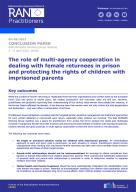Details
- Publication date
- 14 September 2022
- Author
- Directorate-General for Migration and Home Affairs
- RAN Publications Topic
- Multi-agency cooperation
Description
While the number of women returning or repatriated from terrorist organisations and conflict zones to the European Union (EU) has grown in recent years, the related prosecution and conviction rates are still low. However, practitioners are gradually improving their understanding of the various roles women have played (for instance, in the former Daesh-affiliated territories): it has become clear that women were not only victims but also perpetrators and bystanders – and were often a combination of all three.
Practitioners have highlighted a pressing need for targeted gender-sensitive management and treatment approaches for such women detained or imprisoned upon return, especially when children are involved.
The RAN PRISONS Working Group meeting was a space for practitioners from across the EU to analyse the needs and challenges involved in supporting female returnees in prison and ensuring the best interest of children with imprisoned parents. Lessons learned and good practices in multi-agency cooperation to that end were central to the discussion.
The following key outcomes were noted.
- No single or universal solution exists for children with imprisoned parents. An individualised approach to each and every case is paramount, as each situation is unique. Practitioners should remain unprejudiced when working with imprisoned female returnees and take care not to conflate these women’s experiences and those of other target groups.
- Parent-child relationships should not be instrumentalised for leverage to obtain compliance from parents or extract information from children about their parents. More nuanced and systematic assessment of parental skills and parent-child relationships is essential in order to determine whether to separate mothers from their children.
- Mental health and trauma treatment should be more systematically integrated into rehabilitation work with female returnees in prison. Potential re-traumatisation resulting from mother-child separation should be considered, as should delayed, long-term trauma effects. When children display inconspicuous behaviour, it does not mean they are not traumatised; however, this may result in them being overlooked by youth workers.
- More nuanced approaches are required to foster and safeguard mother-child relationships. Broader structural challenges need to be addressed in terms of providing personnel and child-friendly facilities to ensure regular contact or accommodation of women with children in prison settings. Alternative custody facilities should be considered to allow joint accommodation or regular contact, but also to protect children from exposure to harmful prison environments.
- The mother-child relationship should also be addressed more systematically in rehabilitation and disengagement work, as it is an important motivational factor for imprisoned females. A key aspect here is provision of support to improve parenting styles and repair attachment bonds.
- Multi-agency cooperation should be strengthened in terms of ensuring more systematic exchanges between disengagement practitioners and child welfare workers.

